 Did you ever come up with an idea for an amazing invention and then see somebody else selling it like two years later? And then everybody’s talking about how great it is and you’re like: I KNOW! I invented that whole thing in my head two years ago!!!
Did you ever come up with an idea for an amazing invention and then see somebody else selling it like two years later? And then everybody’s talking about how great it is and you’re like: I KNOW! I invented that whole thing in my head two years ago!!!
Well, that’s exactly how I felt (but in a good way!) when I watched the Dr. Oz episode, The Truth About Antidepressants. I spent the first time I watched it yelling, “That’s what I’ve been saying!” every other sentence and looking around my empty apartment like, Is anybody else hearing this?! Then I spent the second (and third and fourth…) time writing down every single quote I wanted to share with you guys – which basically involved transcribing the entire episode by hand lol :)
Seriously though: this show summarizes everything we always talk about on Prayers and Apples ♥ I love it!! After all of the episodes of Frasier and The West Wing and Mad Men… and Remington Steele and MacGyver (can’t forget the classics – thank you, Netflix!), this Dr. Oz show is officially my favorite TV episode of all time!
…Well, after The Wonder Years episodes, of course ;)
Click Picture to Play!
I tried (unsuccessfully) to upload the entire episode straight to the blog, but unfortunately (as we all know!) I’m a bit tech-challenged. I did, however, succeed in linking the above picture to Dr. Oz’s site (where you can watch the whole thing totally free!) So stop reading and push play!! ;)
…For those of you who are at work and can’t turn up your volume – which is seriously the only good excuse for not watching in person!! – I also took some screenshots (see: I am making some progress with this tech stuff!) ..So you can still catch a couple highlights!
“One of the most important shows we’ll do all year…”
Dr. Oz begins by saying this subject is one he’s “passionate to sound the alarm on.”
“For twenty years, you’ve been told [antidepressants] are a miracle cure… But new research is bringing terrible evidence to light: Antidepressants don’t work for most patients. They can actually make your problems worse. They may even cause deadly harm.”
Then Dr. Oz throws around some scary (but familiar) statistics – like the fact that one in ten Americans (or 30 million people!) are currently taking antidepressants.
“…these powerful drugs aren’t helping anymore than a placebo…”
(Long-time readers probably recognize that claim from a post way back in October called, Antidepressants Versus Placebos, featuring Irving Kirsch, associate director of the Placebo Studies Program at Harvard Medical School. For a refresher, check out Kirsch’s 60 Minutes interview.)
Dr. Oz continues:
But most alarming? [Antidepressants] may actually be changing your brain.
So how did we get this whole antidepressant thing so wrong? Dr. Oz explains:
“So you go to the doctor – and, by the way, I was taught this too. So you’re not alone. We’re all in this together… So there’s reason to believe, and there’s some research behind this, that if you have low serotonin levels in the brain, then you’ll get dark, you’ll feel low. So what was happening? People were being prescribed antidepressants. The goal was to boost your serotonin level. But here’s the catch. There’s not a lot of data – in fact, almost zero evidence, that depression is caused by serotonin imbalance.”
(Pretend the blue Kool-Aid = antidepressants.)
“So what happens if your problem isn’t from serotonin? Now you’re taking these pills, you’re flooding your brain – but instead of getting the benefit that you desire, instead you begin to cause all different types of chemical imbalances in the brain. You take all the pills you’re supposed to and maybe this guy over here is doing fine, but you’re actually leaking out as much as we’re putting into you! And you’re wreaking neurohormonal havoc! Chemicals are going haywire in your brain!”
It’s not just Dr.Oz…
Did anyone catch that Are Probiotics the New Prozac? article on the Yahoo! homepage last week? (If so, you’ll appreciate this super dorky Kevin Bacon-ish connection.) Neuropsychiatrist, Dr. Daniel Amen, is quoted in that article as saying:
When you combine published and unpublished studies of antidepressants, the treatments we have today are no better than they were 50 years ago.
And… you guessed it! He’s also on Dr. Oz’s panel :)
Dr. Amen sheds even more light on how things got off track, explaining that there are two types of depression – one where the brain shows signs of over-stimulated activity and one where the brain shows signs of under-stimulated activity:
Without administering a brain scan, there’s absolutely no way to tell which one a patient has. So when you walk into your regular doctor’s office and leave with a prescription, there’s only a 50% chance that you were prescribed the type of antidepressant that targets your specific level of brain activity. Dr. Drew (yep, he was there too!) drives the point home:
As a primary care doctor [you] have no training in distinguishing between the two.
So I know I sound like a groupie but…
You guys really need to watch this show!!
Depression is a very real, very devastating disorder – and it’s important that we weed out ineffective treatments, so we can focus our energy on strategies that are going produce the most beneficial results.
…Like I said, older posts have linked to almost all of the studies the show mentions (and if not, you know I’m game for finding the rest!) – so please let me know if you have any questions!
Thanks for reading! :)
If you found this article informative, please consider sharing with your friends! ♥
Resources
Bonin, R. (Producer). (19 February 2012). Treating Depression: Is there a placebo effect? 60 Minutes.
Cool, L.C. (12 July 2013). Are Probiotics the New Prozac? Yahoo Health.
Harvard Medical School. (11 September 2012.) Placebo Goes Beyond Consciousness.
The Dr. Oz Show. (3 April 2013). The Truth About Antidepressants.

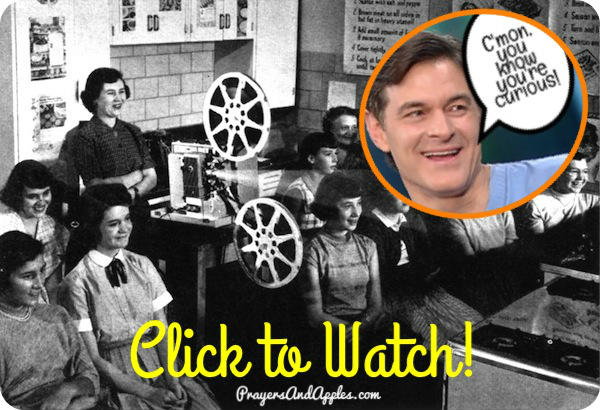
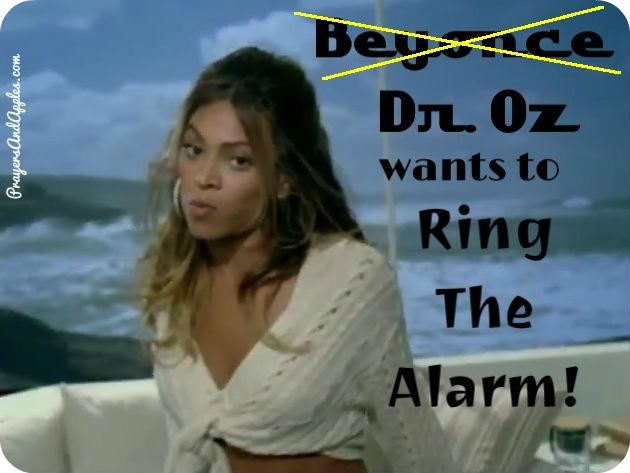
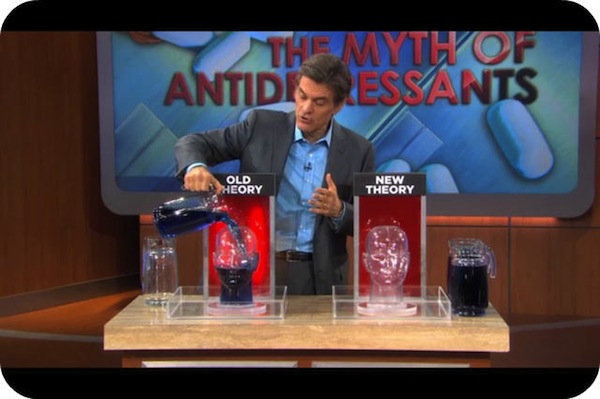
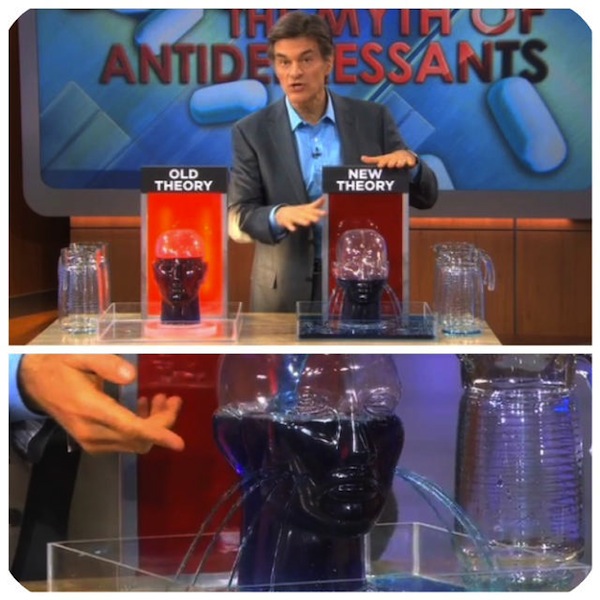
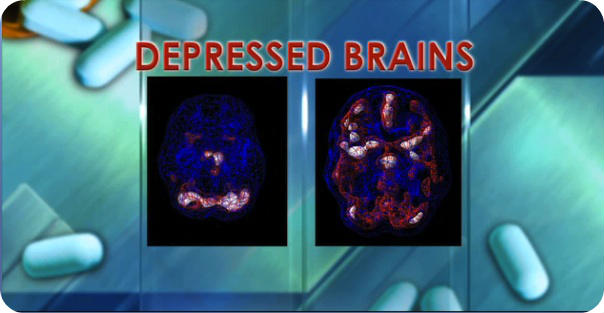

Holy cow what a great post Jessica! This past year has been really tough and at times I would definitely say that I was depressed on occasion. It is really easy for us to want to just run to the Dr. and get prescribed some medication to help us with our sadness. Not that in some situations its a bad thing, but I just hate taking medication for it.
Thank you for sharing this!! :)
Glad you enjoyed! I think it’s so important to share this information – depression is definitely a very real and difficult disorder and I think that sometimes people think that by not being a fan of antidepressants they’re in some way discrediting the disorder, which isn’t the case at all – it’s actually the opposite! By bringing info like this to light, I think the doctors on the show (and me, with this post!) are trying to redirect people’s focus to alternative treatments (like exercise, therapy etc.) that have a more proven/better success rate :) Thanks for taking the time to comment! :)
Jessica,
I really do love the way you write! You deliver a powerful message and engage with the reader so beautifully. Truly girl! Love you.
And this message…all I kept thinking was how glad I was that I gave up on taking antidepressants for depression a LONG time ago. I never did any research but I hated the way they made me feel.
I will have to come back and watch the episode. I’m using the “I’m at work” excuse. :) You do have me a bit anxious to watch.
Thank you!! :) You’ll have to let me know what you think after you watch :)
I’d love to talk to u more about this if u’d email me (?). I refuse them and keep refusing them (despite pushy doctors)…just can’t bear to take them :( Yet I’m still an insomniac and a worrier and emotional late night eater…so I dunno anymore…so fed up with me. I’m 32 and rock bottom. Nice blog!
Hi Dee!
So glad you found the information helpful! Sorry to hear about everything you’re going through – email me via the contact form (on the ‘About Me’ page) and I’d be happy to share some more resources :)
Wishing you all the best!
Boy did you touch a spot with me – I have a very close friend who is a manic depressant and really has to rely on medication. I never was one to advocate antidepressants. But I also came to a point at once in my life where counseling, excersize, etc. weren’t touching me. I sat staring into space all day. I really truly could not control my own actions … so I ended up down the road of antidepressants. I actually agree with you in theory but I would take them again if I reached that point again…. but I also responded to them unlike many of the unfortunate people you are speaking about. Thank you for sharing!
Hi Susan, thanks so much for commenting! You bring up an excellent point (and I’ll try to write a post with more information in the future!) about manic depressive disorder. Manic depressive disorder (now re-named by the DSM as “bipolar disorder”) is very different from depression. Unlike depression, which is a unipolar disorder, bipolar disorder is characterized by a mixed experience of manic – or hypomanic, in the case of bipolar II disorders – and depressive episodes (hence its old name!). According to Goodwin & Jamison (2007) (as cited in Butcher, Hooley & Mineka (2010),
“The most widely replicated differences are that relative to people with a unipolar depressive episode, people with a bipolar depressive episode tend, on average, to show more mood liability, more psychotic features, more psychomotor retardation, and more substance abuse. By contrast, individuals with unipolar depression, on average, show more anxiety, agitation, insomnia, physical complaints and weight loss.”
So in addition to not experiencing manic episodes, people with unipolar depression (or what we normally refer to when we say “depression”) also experience different types of depressive episodes. So the two are very different and, as such, require different types of treatments. (Sorry for rambling on! I’m just particularly sensitive to bipolar issues, so it’s nice to have an opportunity to discuss them!) Bipolar disorder is most commonly treated with antipsychotics or mood-stabilizers, sometimes in combination with antidepressants (although almost never with antidepressants alone, as these types of drugs are associated with “significant risk of precipitating manic episodes or rapid cycling” (Butcher et al., 2010). With the proper prescription and dosage, the results can be remarkable and lifesaving :)
All this is to say: if your friend suffers from bipolar disorder, he/she should most certainly take all medication as prescribed – it is a crucial and, at this time, unparalleled treatment element for that particular disorder :)
And I’m glad you were able to find an antidepressant that worked for you! I hope you don’t think I’m anti-medication across the board! :) There are plenty of people who need more than counseling and a healthy lifestyle, and often times medication can bridge that gap. My hope in presenting this information, is that people will turn to holistic treatments as a first choice measure or as a supplemental treatment element (so that maybe they can take less medication than they normally would). I also think it’s important to spread the word about these new studies, because there are plenty of people who unfortunately don’t respond at all to medication (or have terrible side-effects!) – so it’s important to find plans that will work well for them! :)
Thanks again for taking the time to read and comment – and sorry about my super long response!! lol :)
All the best,
xo Jessica :)